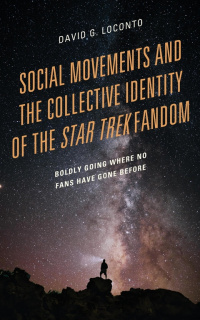Social Movements and the Collective Identity of the Star Trek Fandom
Das Buch Social Movements and the Collective Identity of the Star Trek Fandom beschäftigt sich mit dem Star-Trek-Fandom.
Inhalt[Bearbeiten]
- Vom Umschlagtext:
Since it first aired in 1966, Star Trek has led American television into a more progressive era by presenting a diverse cast interacting as equals, demonstrating expertise and efficiency as they lead a starship across the galaxy. To this day, the Star Trek franchise strives to inspire viewers to find beauty in diversity and progress. In Social Movements and the Collective Identity of the Star Trek Fandom: Boldly Going Where No Fans Have Gone Before, David G. LoConto explores the development of the Star Trek fandom from its uncertain beginnings in the 1960s, to the popularity explosion in the 1990s and its triumphant return in 2017. LoConto analyzes the cultural phenomena of Star Trek through a social psychological approach, using symbolic interactionist and strategic ritualization theories, as well as ideas from Habermas and Foucault to track the fandom's movements, values, and evolution.
Inhaltsverzeichnis[Bearbeiten]
- Part I: Foundations
- 1 The Importance of Narratives, Science Fiction, and Star Trek
- 2 Fandom
- Part II: Star Trek Fandom, 1966–2019
- 3 Symbolic Interaction, Resource Mobilization Theory, and Fandom, 1966–1969
- 4 Social Movement Societies and Fandom, 1970–1979
- 5 From Social Movement Society to Stability, 1980–1989
- 6 Cultural Diffusion and Changing Identity 1990–2001
- 7 The Long Road and Multiphrenia, 2001–2016
- 8 We Deserve a New Series! New Beginnings
- Part III: Behavior and Star Trek Fandom
- 9 Collective Identity and Rituals at Conventions
- 10 I Cosplay, Therefore I Am
- 11 Power, Politics, and the Fandom
- 12 The Impact of Social and Digital Media on the Fandom
- Part IV: Conclusions
- 13 The Future of Star Trek and Its Fandom
- References
- Index
- About the Author
